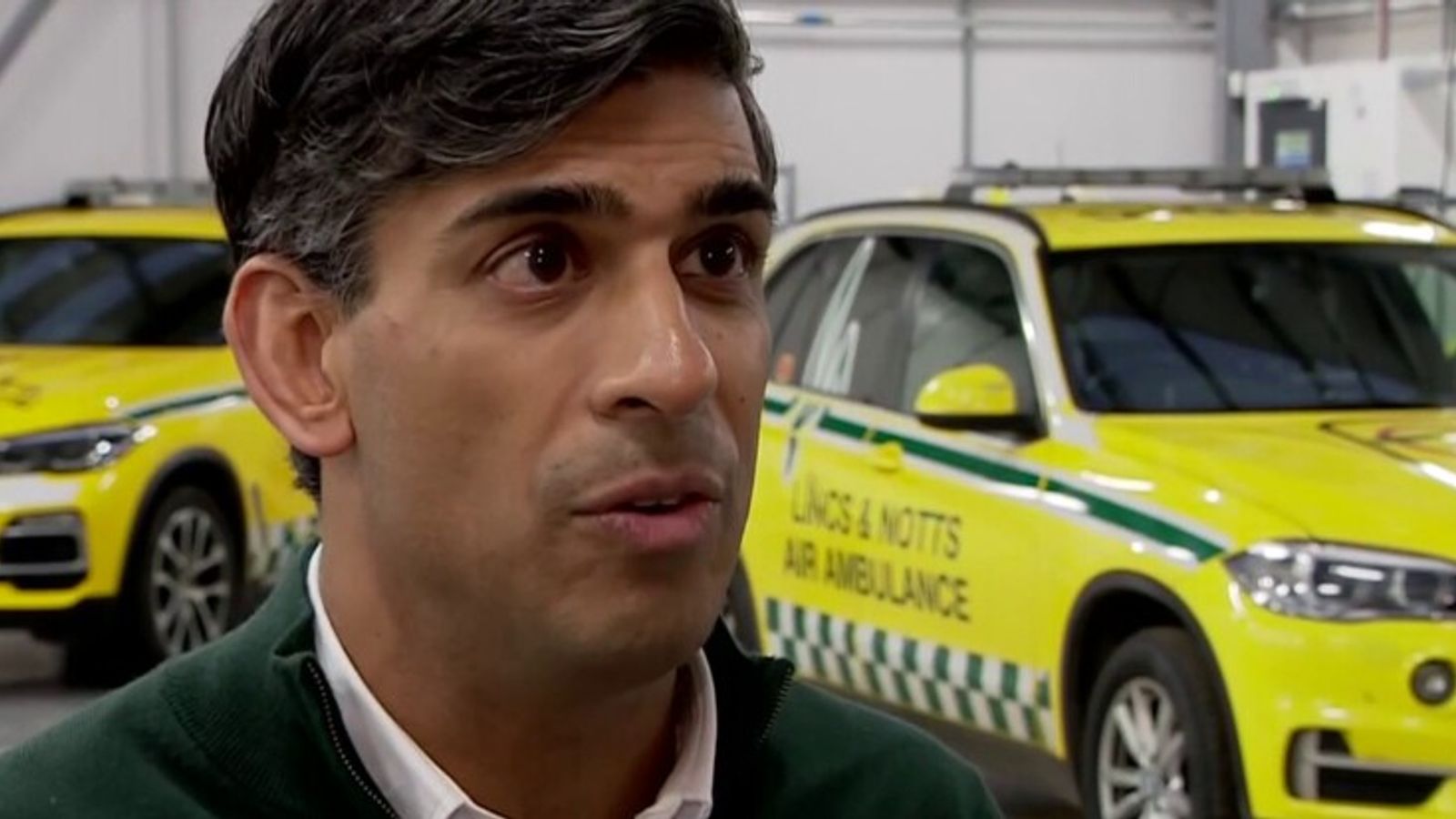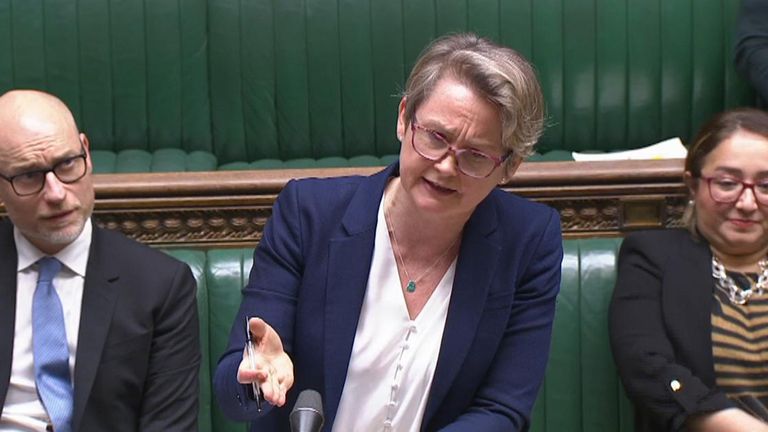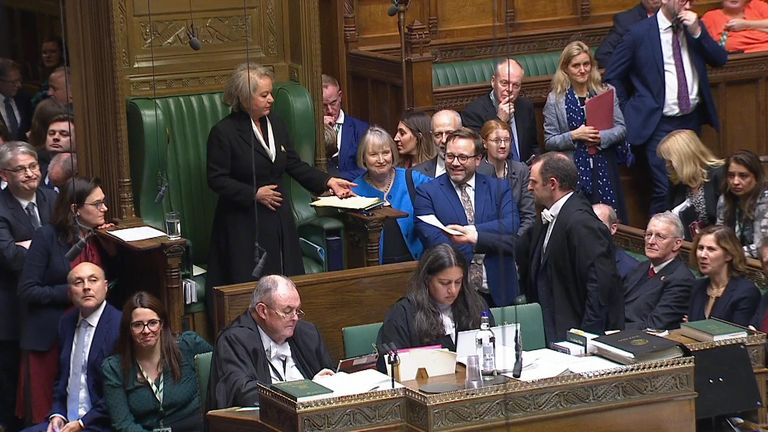Rishi Sunak under fire from own MPs over family visa salary threshold ‘delay’


Rishi Sunak is under fire from his own MPs after rowing back on plans to lift the salary threshold for a family visa – with some Tories accusing him of “weakness”.
The prime minister said the government was “increasing the salary threshold significantly” to £38,700 in “early 2025” – a change from the original plan laid out by Home Secretary James Cleverly earlier this month.
The threshold for a family visa – which applies to Britons who wish to bring family members to the UK – was due to rise from £18,600 to £38,700 next spring in a bid to reduce legal net migration, which hit a record high last year.
But on Thursday night the Home Office quietly watered down the measure, saying the threshold would first be raised to £29,000 from the spring, and then increased in “incremental stages” – though no timetable was set for when the top figure would be introduced.
The climbdown has angered Tory MPs on the right of the party in favour of tighter migration controls.
David Jones, deputy chairman of the right-wing European Research Group, told the PA news agency it was a “regrettable sign of weakness” while Jonathan Gullis, a Conservative former minister wrote on X that it was “deeply disappointing and undermines our efforts”.
Former minister Sir John Hayes, chairman of the Common Sense Group of Tory MPs, told the BBC the earnings threshold should rise to £38,700 “quickly” to give people “certainty”.
Robert Jenrick, who quit as immigration minister over the government’s stalled Rwanda plan, was also among the critics, with a source close to him saying: “The whole package needs to be implemented now, not long-grassed to the spring or watered down. More measures are needed, not less.”
Advertisement
Speaking to reporters while visiting ambulance workers in Lincolnshire, the prime minister insisted the government was doing “exactly as we said” in terms of raising the salary threshold for a family visa, but that the process would happen in “two stages”.
He confirmed that the threshold would increase from £18,600 to £29,000 from next spring before going to the “full amount” in early 2025.
“So it’s exactly what we said we’re doing, we’re just phasing it over the next year or so,” he added.
Earlier this month Mr Cleverly outlined a five-point plan to reduce legal migration after net migration hit a record-breaking 745,000 in the year to December 2022.
Please use Chrome browser for a more accessible video player
0:14
Rishi Sunak is spotted buying several boxes of mince pies
Other measures announced in the plan include a ban on care workers bringing over their families and raising the minimum salary for a skilled worker visa from £26,200 to £38,700.
Mr Cleverly told the Commons last month the government would “increase the skilled worker earnings threshold by a third to £38,700 from next spring, in line with the median full-time wage for those kinds of jobs”.
‘Tail wagging the dog’
The original plan was criticised by immigration researchers at The Migration Observatory at Oxford University, who warned the new family visa rules could leave British citizens with a foreign partner facing greater restrictions on who they can live with than migrant workers.
It said the plan to hike the family visa salary threshold to £38,700 could mean that “in some circumstances, British workers would face more restrictive rules on family than migrant workers in the same job”.
Click to subscribe to the Sky News Daily wherever you get your podcasts
Labour’s shadow international development secretary Lisa Nandy said the backtracking was “just another example of the tail wagging the dog” and accused the government of “running scared of its own back benches”.
Asked whether the party would allow the rise to go ahead if it wins the next election, Ms Nandy said Labour had been “clear all along that immigration policy has to be aligned with skills” to address shortages here in the UK.
Shadow home secretary Yvette Cooper said ministers “failed to consult anyone on their new proposals and took no account of the impact of steep spousal visa changes on families next year, so it’s no surprise they are now rowing back in a rush”.

The Liberal Democrats suggested the planned £38,700 threshold had always been “unworkable”, with the party’s home affairs spokesman Alistair Carmichael branding it “yet another half-thought-through idea to placate the hardliners on their own back benches”.
Rwanda policy troubles
As well as seeking to reduce legal migration, the government has made stopping small boat crossings in the Channel a core part of its strategy to reduce illegal migration.
To achieve that aim, the government wants to deport asylum seekers who arrive in the UK by irregular means to Rwanda.
Mr Sunak saw off a rebellion over the plan earlier this month, but further battles are likely to await him in the new year as right-wing Tories demand the bill goes further while those on the moderate wing have warned Mr Sunak that he risks losing their support if he significantly alters the bill to placate the right.

As well as deporting asylum seekers to Rwanda, the government has sought to manage the high number of people arriving by small boat by housing them in former military bases – including the Catterick Garrison in his own constituency of Richmond.
However, there have been reports in the Times that the Home Office had assessed the garrison as unsuitable for a large asylum facility.
Read more:
Cleverly’s climbdown over family visas looks like a hasty, panic retreat
Starmer’s glitter shower to Cameron’s comeback: 2023’s unexpected political moments
Please use Chrome browser for a more accessible video player

1:41
‘Rwanda plan won’t stop crossings’
The prime minister confirmed the Home Office assessment but said it was still his intention to use a military base in his constituency to house refugees from Afghanistan.
He said it was “not right” to suggest his constituency was different from any other constituency when asked why plans for the garrison had reportedly been scrapped.
“More generally taking a step back, stopping the boats is a massive priority of mine,” he said.
“It’s something I said I wanted to do because that’s ultimately the best way to relieve pressure on hotels and other areas and local communities.”